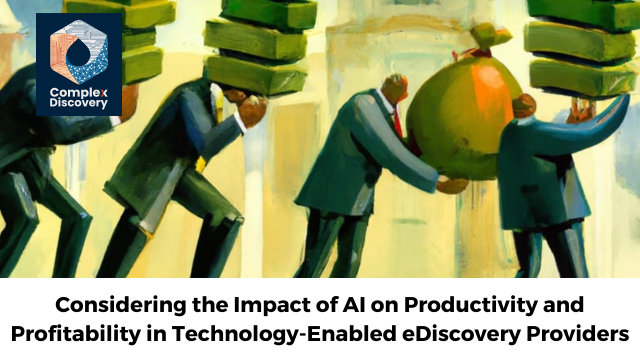[EDRM Editor’s Note: This article was first published here on June 6, 2023 and EDRM is grateful to Rob Robinson, editor and managing director of ComplexDiscovery, for permission to republish.]


[ComplexDiscovery Background Note: Recently, Venture Capitalist Tomasz Tunguz shared an excellent article, “How Much More Efficient Should a SaaS Startup Be When Using AI?” on his blog. The concepts presented in his article provide one reasonable framework for technology-enabled eDiscovery providers to begin to assess the potential impact of AI on their productivity and profitability. By focusing on areas ranging from engineering workflows and common workstreams to content marketing, providers can objectively and measurably leverage AI to improve efficiency, reduce costs, and enhance their overall offerings in the market. While the article is focused on typical SaaS companies, it should be instructive for technology-enabled eDiscovery providers as they consider AI.]
ComplexDiscover Backgrounder*
Unlocking Efficiency? Harnessing AI for Greater Productivity by eDiscovery Providers
Commentary on Expert Article by Venture Capitalist Tomasz Tunguz
Venture Capitalist Tomasz Tunguz, in his article “How Much More Efficient Should a SaaS Startup Be When Using AI?” discusses the potential impact of AI on the profitability of SaaS companies and suggests areas of focus for startups exploring AI applications.
In his article, Tunguz notes the potential workstream productivity gains in sales development, content marketing, and software engineering within 12-24 months. He predicts that AI could bring an overall gain of 13% to a typical SaaS company: 1.5% from sales development and content marketing each and 10% from engineering. With team productivity gains ranging from 30% in content marketing to 25% in engineering.
According to him, AI initiatives should prioritize the engineering department due to its potential for higher productivity gains and significant representation within the company. While smaller teams like content marketing may see substantial productivity leaps, these won’t drastically affect the company’s financial profile due to their smaller size.
Tunguz also advises startups to prioritize common workflows across large employee populations or focus on high-earning employees. The matrix he presents in his article suggests focusing on AI for executives and common workstreams.
Applying these ideas to technology-enabled eDiscovery providers, and specifically to their internal teams, we can derive a few considerations:
- Evaluate Potential AI Initiatives: Similar to Tunguz’s approach, assess where AI could bring the most efficiency gains within your organization. Considering the nature of eDiscovery, departments such as data analysis, document review, or project management could be potential candidates.
- Prioritize Areas of High Impact: Align AI initiatives with the larger teams or those with higher-paid employees. If a substantial portion of your workforce is involved in data processing or legal review, for example, AI implementation in these areas could yield significant productivity gains.
- Consider Specialized AI Applications: If there are specialized workflows unique to the eDiscovery process, consider AI solutions tailored to these processes, despite their smaller team size. The cost and time savings in these specialized areas might be substantial.
- Justify AI Investments: Every investment in AI needs to be justified, either through cost savings or increased revenues. This applies to both internal teams and to customers, who need to see the value provided by AI-enhanced eDiscovery services.
For technology-enabled eDiscovery leaders, the following questions could spur consideration and use of AI to increase efficiencies:
- Which are the largest teams within our organization, and how can AI increase their productivity?
- How can AI improve the workflows of our highest-paid employees?
- Are there specialized workflows within our eDiscovery process where AI can bring significant efficiency?
- Can we quantify and demonstrate the cost savings or revenue increase from our AI investments?
For a deeper understanding of Tunguz’s insights, I recommend reading his original blog post. His matrix and mental model could provide valuable guidance for eDiscovery providers aiming to leverage AI for efficiency gains.
Post Script
A closer look at Tunguz’s insights can also help us explore the potential impact of AI on the marketing teams of technology-enabled eDiscovery providers. In his article, Tunguz suggests a potential 30% productivity gain for content marketing teams through AI, which despite being a smaller fraction of the company, could still significantly improve departmental efficiency.
With regards to AI application in marketing by eDiscovery providers, here are some considerations:
- Content Creation and Optimization: For technology-enabled eDiscovery providers, content marketing plays a crucial role in educating and attracting potential customers. AI can be utilized in content marketing to automate tasks like content generation, topic research, or content distribution, thereby increasing the productivity of the marketing team. Properly implemented and adhering to data privacy and organizational security requirements, it is reasonable to see an immediate and quantifiable increase in productivity in this area from any eDiscovery marketing team.
- Predictive Analytics: AI-driven predictive analytics can help marketers identify potential leads based on behavior patterns and demographics. This can help tailor marketing strategies, better allocate resources, and improve lead generation efforts. It can also help marketers better understand the importance of awareness and credibility in lead generation and, ultimately, revenue generation.
- Customer Segmentation and Personalization: AI can automate the segmentation of customers based on various factors like browsing behavior, online interactions, and event/conference exchanges. This can help in delivering personalized content and offers, enhancing customer engagement, and increasing conversations and conversions in both online and offline environments.
- Social Media and Sentiment Analysis: AI can not only help in the planning and distribution of social media content, but it can be used to monitor social media platforms and analyze sentiment around brands and offerings. This can provide insight into how your brand is perceived, enable swift responses to customer queries or concerns, and shape your overall marketing strategy.
Remember, while the potential benefits of AI in marketing are considerable, it’s essential to consider the cost and complexity of AI implementation. Assess the skills within your team, the readiness of your existing systems for AI integration, and your team’s ability to interpret and apply AI-driven insights effectively. AI should be seen as a tool that complements your team’s skills and strengths rather than as a replacement.
Read the complete original article by Tomasz Tunguz.
Reference Cite: Tunguz, Tomasz. (2023, June 2). How Much More Efficient Should a SaaS Startup Be When Using AI? Theory Ventures Blog. Retrieved from https://tomtunguz.com/how-much-more-profitable-saas/.
*Assisted by GAI and LLM Technologies
Additional Reading
- A Deep Dive into Uncharted Waters: An Exploratory Analysis of Justice in a Generative AI World
- Managing ChatGPT in the Corporate Environment? Six Crucial Risk Factors Highlighted by Gartner
- Exploring the Inclusion of eDiscovery-Centric Resources in the Google C4 Dataset: A Highly Selective Search
Source: ComplexDiscovery

Generative Artificial Intelligence and Large Language Model Use
ComplexDiscovery OÜ recognizes the value of GAI and LLM tools in streamlining content creation processes and enhancing the overall quality of its research, writing, and editing efforts. To this end, ComplexDiscovery OÜ regularly employs GAI tools, including ChatGPT and DALL-E2, to assist, augment, and accelerate the development and publication of both new and revised content in posts and pages published (initiated in late 2022).
ComplexDiscovery also provides a ChatGPT-powered AI article assistant for its users. This feature leverages LLM capabilities to generate relevant and valuable insights related to specific page and post content published on ComplexDiscovery.com. By offering this AI-driven service, ComplexDiscovery OÜ aims to create a more interactive and engaging experience for its users, while highlighting the importance of responsible and ethical use of GAI and LLM technologies.

